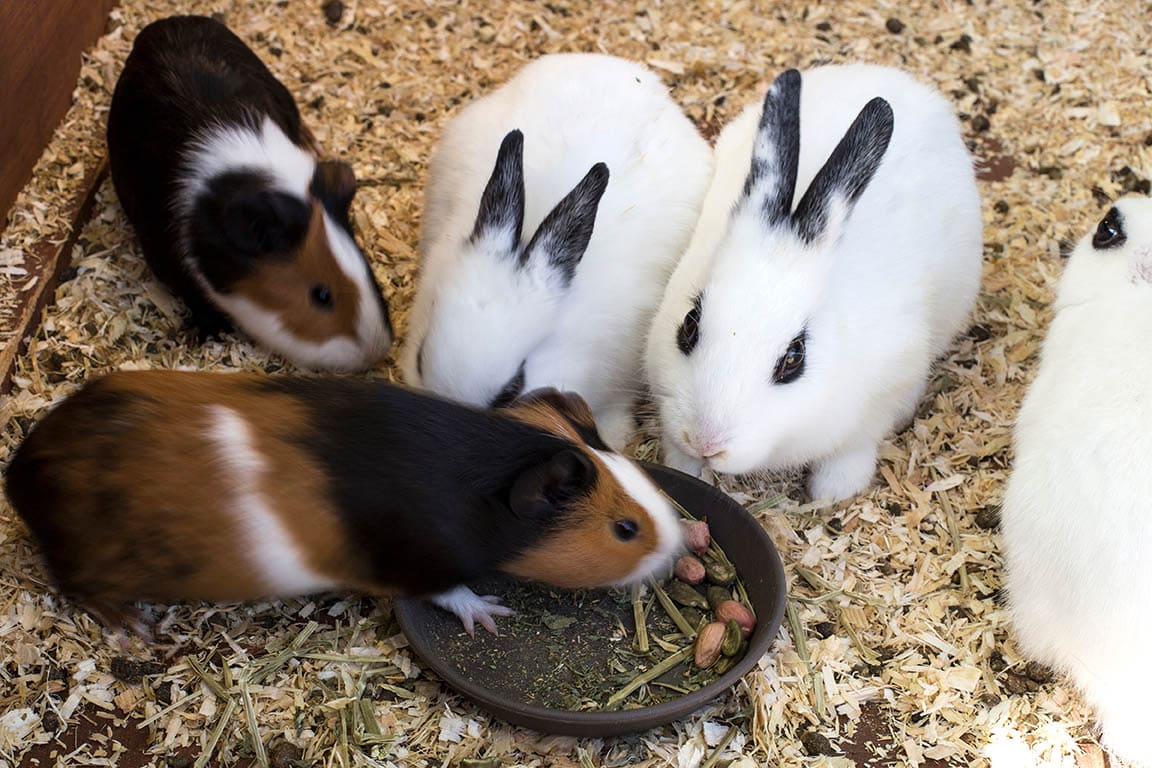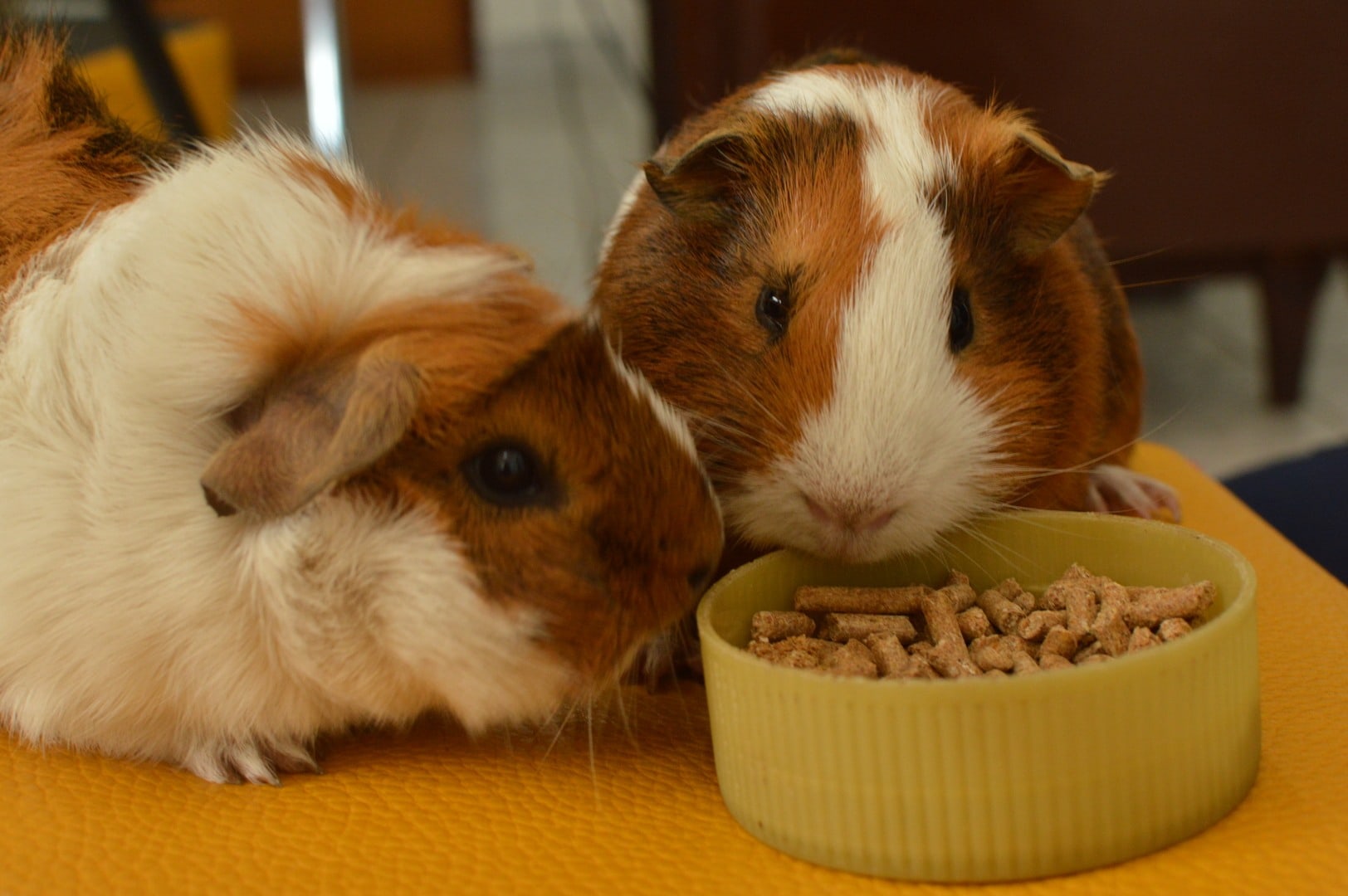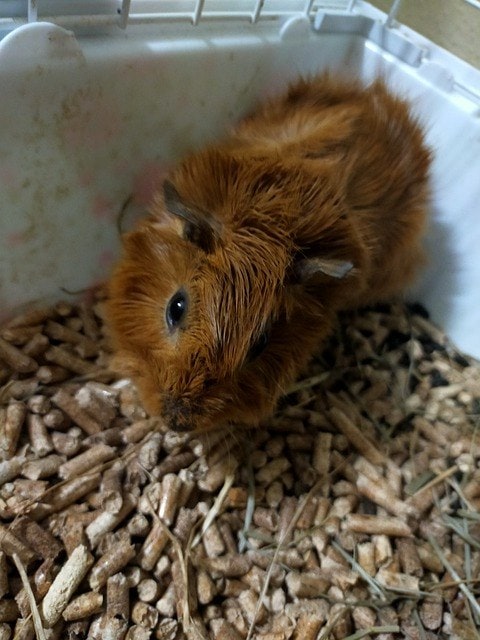Can I Feed My Guinea Pig Rabbit Food

Have you ever mistakenly bought rabbit food for your guinea pig? Some people notice this long after the packet is halfway empty. If you're ever in a pinch and only have rabbit food to offer your guinea pigs, you might wonder can guinea pigs eat rabbit food? While they can eat it, it does not help them much from a nutritional standpoint .
Rabbits and guinea pigs are both herbivores. The diet mainly consists of veggies, fresh hay, and fruits. They both need vitamins and minerals in their diets, but some of the nutrients in guinea pig food are absent in rabbit food. Frequent consumption of rabbit food by a guinea pig can lead to recurring infections due to a weakened immune system.

Is Rabbit Food Safe for a Guinea Pig?
Most rabbit food lacks vitamin C, which plays a vital role in boosting guinea pigs' immune systems. While rabbits can synthesize this vitamin on their own, guinea pigs cannot. You will not want to put your pet on a diet that isn't as nutritionally dense as it should be. Also, rabbits cannot excrete vitamin C, which can damage their kidney. On the other hand, guinea pigs can get rid of the excess. Therefore, it is not practical to feed rabbits and guinea pigs the same food as you are likely to compromise one of their dietary requirements.

What Nutrients and Food Do Guinea Pigs Require?
The ideal food for guinea pigs is pellets that contain fibers, proteins, and a variety of vitamins, including vitamin C. Cavies should feed on unlimited hay and fresh water. Proteins are necessary to build muscles and for enzyme functions to form albumin crucial for transporting bodily substances like hormones and therapeutic drugs.
Fiber is vital for physical food satisfaction and prevents constipation by facilitating a bulky fecal matter that easily stimulates the defecation reflex. It also has some crucial antioxidants that will help detoxify harmful radicals in the body, thus ensuring good heart function. Ensure you also provide your guinea pig with a good amount of veggies and fruits.

Difference Between a Guinea Pig and Rabbit Nutrient Requirement
Understanding the nutritional requirements of these two animals will help you attend to their dietary needs appropriately. Rabbits need 18% fiber, 16% protein, and 1% or less calcium. On the other hand, guinea pigs require 10-16% of fiber, 18-20% of protein, 1% or less calcium, and 25-50%mg of vitamin C.
Nutritional Imbalance
Two dangerous results of a guinea pig eating rabbit food consistently are too much fiber and an insufficient amount of protein.
High Fiber — rabbit food has more fiber compared to guinea pig food. Excess fiber intolerance is not apparent initially, but with time you will observe feeding changes due to internal unrest. Your pig will begin to bloat and eat less because it will feel full. Your guinea pig can develop diarrhea which will lead to dehydration if it continues for extended periods.
Low Protein — the low protein content in rabbit food will not satisfy your pig's need; thus, it will fail to thrive. Guinea pigs require proteins to build strong muscle, bones and also for maintaining shiny hair. Low protein diets can stunt your piggy's growth. Furthermore, their hair can turn dull or sometimes fall out.

Other Hazards of Having Rabbit Food for Guinea Pigs
Choking Risk
Rabbits mostly eat seeds and nuts, which pose a choking risk to guinea pigs since they have a much smaller food pathway.
Allergic Reactions
Guinea pigs are more likely to develop allergic reactions since they do not have a robust immune system, which is also one reason they need more vitamin C. Some rabbit food can cause dangerous hypersensitivity reactions in guinea pigs. These sensitivities can lead to skin inflammation and mucous membranes of essential parts of the body like the airway, which is fatal.
Excessive Fats and Proteins
Rabbit food contains too many carbohydrates, calories, and proteins. Guinea pigs don't require these nutrients in such large doses. Excessive fats and carbohydrates are harmful to the guinea pig's heart thus will compromise their cardiac function. They may also suffer from high blood pressure and other heart conditions. You must balance the number of fats and proteins in your pig's diet.

Illnesses
Prolonged feeding of guinea pigs on rabbit food weakens its immune system; thus, it can be attacked and overwhelmed by simple infections that can be easily avoided by proper feeding. Guinea pigs are also commonly affected by scurvy, a disease also caused by vitamin C deficiency.
Some rabbit foods have antibiotics like penicillins that can harm guinea pigs.
Destruction of Normal Flora
Some rabbit food can lead to the clearance of essential bacteria in your pet. Some of these bacteria are important for the synthesis of vitamins. Resident bacteria also aids food digestion and also act as nutrient sources themselves. One of the significant risks of killing resident bacteria is the increased risk of infection. The absence of resident bacteria allows the pathological bacteria and fungi to thrive and cause infections.

Guinea Pig Vitamin Deficiency
Vitamin C deficiency causes skin and joint problems. Some of the symptoms will include reduced appetite, diarrhea, wound healing difficulties, lameness, joint swellings, and frequent infections. Vitamin C deficiency will also impede the synthesis of collagen and cause blood clotting abnormalities.
Diagnosing of Vitamin C Deficiency
A vet will diagnose vitamin deficiency by performing a physical examination and subjecting your pet to blood tests. Following the diagnosis, your pet will be subjected to vitamin supplementation for 1-2 weeks. For good results, consult your vet for the best dietary plan and ensure you monitor daily until the undesirable symptoms disappear.

What To Look For in Guinea Pig Food
Now that we understand why rabbit food isn't good for guinea pigs, we can talk about which guinea pig food is suitable for different groups of pigs. Timothy-based pellets are the best for adult pigs as they give a good check on their weight.
Alfalfa-based pellets supply plenty of fats and proteins needed for growth, making them ideal for pigs under 6 months. To avoid obesity, don't feed them nuts, seeds, and dried fruits but supply high-quality timothy hay and orchard grass.
In addition to these, provide green vegetables and fruits daily. Provide at least a cup of fresh food daily. Some of cavies' favorite fruits and vegetables include; carrots, zucchini, dark leafy greens, broccoli, thyme, bell peppers, peas, dandelions, and celery.

Conclusion
As much as guinea pigs and rabbits have similarities, feeding guinea pigs on rabbit food is not advisable. Although they both require similar nutrients to thrive, the requirement is not the same in terms of quantity. Thus, it would help if you fed your cavies with the designated food for them.
Featured Image Credit: Lamberrto, Shutterstock
Source: https://petkeen.com/can-guinea-pigs-eat-rabbit-food/#:~:text=If%20you're%20ever%20in,%2C%20fresh%20hay%2C%20and%20fruits.
0 Response to "Can I Feed My Guinea Pig Rabbit Food"
Post a Comment